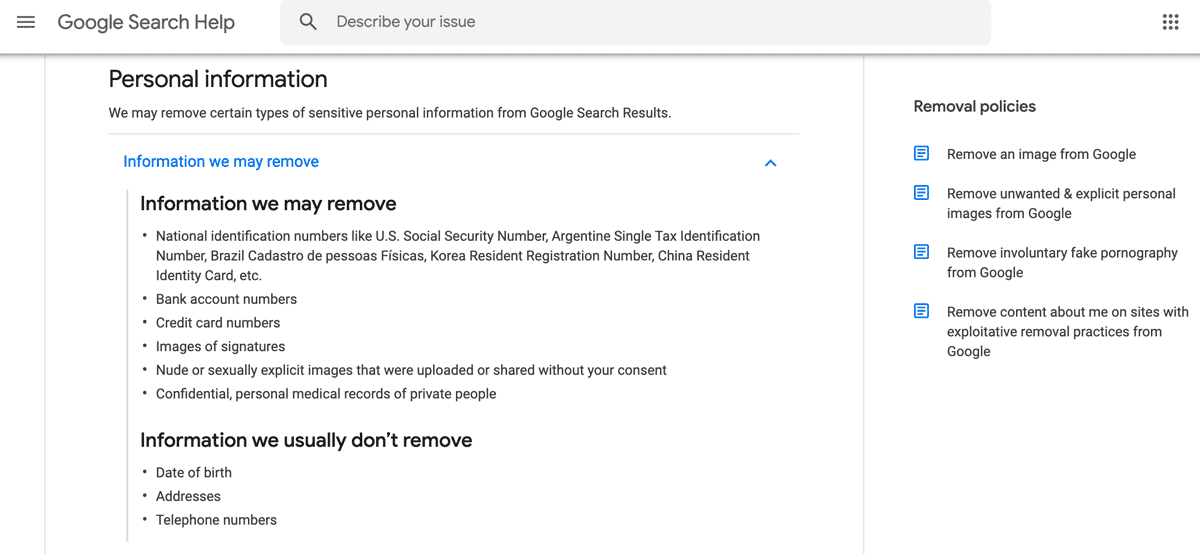When Will Google Remove Search Results? How Long It Takes
Google will usually remove sexually explicit photos or videos that are distributed without consent for harassment purposes – in our experience it’s often by angry ex-partners.
Does Google remove revenge porn?
Yes, it does.
Google has stated that it will voluntarily remove this content upon request, and the company even offers a revenge porn web form that can be filled out for that purpose.
Does Google remove personal data?
Yes, but it depends on the kind of data.
Google is willing to remove personal information, again through a simple web form application.
Google may consider removing the following information:
- Government-issued identification numbers
- Information used for common financial transactions
- Information that could lead to financial harm or identity theft
- Information considered confidential
The below screenshot shows more detailed information on the type of information that can be removed, as well as information Google doesn’t usually remove.
Google considers requests on a case-by-case basis. Note: Google does not remove publicly available information from government websites – it can’t.
What do Google and “X” do about child abuse imagery?
Google takes an active stance when it comes to removing child abuse imagery, sexual or otherwise. In fact, in conjunction with “X”, the internet giant has created a tagging system for child abuse imagery, as well as a web crawler to find and remove child pornography. Google wrote this software in partnership with the Internet Watch Foundation, which seeks to curb child pornography.
How can harmful online information be removed/de-indexed?
Some of the negative information found on the web can cause great damage, yet it may not strictly fall under these categories. Information that harms your reputation, whether it’s your personal reputation or that of your company, is extremely difficult to de-index, even in cases when the information is probably not true.
There are other reputation management strategies that can help you to improve the overall sentiment of your search rankings.
How to get online content de-indexed
Google has tips for online reputation, but they’re very weak. In our experience, if a person or brand has any notability at all Google’s guidelines will not work.
Removing URLs from Google, when possible, is what we do. Reputation X has a long track record of success when it comes to helping to repair company and personal reputations. We can help you in your endeavors to de-index harmful information online. We can also help in cases when de-indexing requests have been denied. Repairing your online reputation is not easy, and what worked yesterday may not work today. But help is at hand – we successfully transform online reputations every day.
Contact us to get started today.
Remove search results FAQs
What is de-indexing?
De-indexing is removing web pages from Google. De-indexing removes a search result directly from the index and cache (the snapshot Google takes of web pages and stores on its servers) of search results.
What types of content can be de-indexed?
Web content that can be removed from search engine indexes includes copyright infringement, child abuse images, social security numbers, bank account numbers, credit card numbers, signature images, and sexually explicit imagery that has been posted without consent.
Does Google remove revenge porn?
Yes, it does. Google has stated that it will voluntarily remove this content upon request, and the company even offers a revenge porn web form that can be filled out for that purpose.
What do Google and “X” do about child abuse imagery?
Google takes an active stance when it comes to removing child abuse imagery, sexual or otherwise. In fact, in conjunction with “X”, the internet giant has created a tagging system for child abuse imagery, as well as a web crawler to find and remove child pornography. Google wrote this software in partnership with the Internet Watch Foundation, which seeks to curb child pornography.
How can harmful online information be removed or de-indexed?
Some of the negative information found on the web can cause great damage, yet it may not strictly fall under these categories. Information that harms your reputation, whether it’s your personal reputation or that of your company, is extremely difficult to de-index. Even in cases when the information is probably not true.
Tags: Online Reputation Repair.

